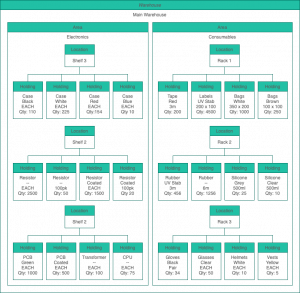Difference between revisions of "Stock Locations"
Jump to navigation
Jump to search
| Line 1: | Line 1: | ||
== Overview == | == Overview == | ||
The PRS Stock warehousing system is built on the concept of stock holdings, which are groups of products of the same catalogue number, style, size, held in a particular location. Holdings within PRS are automatically created as products are received into the warehouse, and closed off once the products within that holding are issued from the warehouse. Holdings are grouped into Locations, which can in turn be grouped into Areas and Warehouses, allowing scalability of the system from a simple, single-location store to a distributed multi-warehouse network. | |||
[[File:Warehouses, Areas & Locations.png|thumb|300x300px|Example Relationship between Warehouses, Areas, Locations and Holdings]] | |||
=== Holdings === | |||
=== | === Locations === | ||
=== Areas === | === Areas === | ||
=== | === Warehouses === | ||
=== Movements === | === Movements === | ||
Revision as of 09:23, 17 October 2022
Overview
The PRS Stock warehousing system is built on the concept of stock holdings, which are groups of products of the same catalogue number, style, size, held in a particular location. Holdings within PRS are automatically created as products are received into the warehouse, and closed off once the products within that holding are issued from the warehouse. Holdings are grouped into Locations, which can in turn be grouped into Areas and Warehouses, allowing scalability of the system from a simple, single-location store to a distributed multi-warehouse network.
Holdings
Locations
Areas
Warehouses
Movements
PRS Desktop
PRS Mobile
See also:
